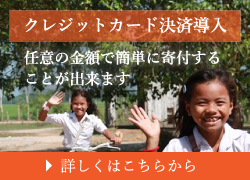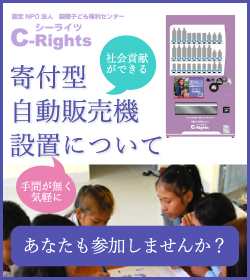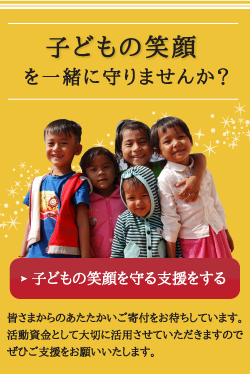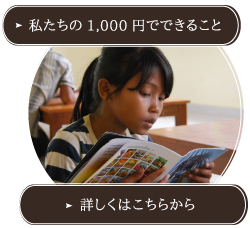- C-Rights TOP >
- C-Rights English
C-Rights Who are we?
About Us
Our goal
Vision Statement
Mission Statement
Our Activities
What are the rights of the child?
About Us
Japan International Center for the Rights of the Child (C-rights), established in 1992, is a certified Non-Profit Organization (NPO) that works towards the realization of the rights of all children around the world. The three core elements of our activities are:
1) Raising public awareness on the United Nations Convention on the Rights of the Child (UNCRC)
2) International Cooperation: supporting children in Cambodia, especially tackling issues of child labor, and human trafficking
3) Development Education
Active civic participation, particularly child participation and child protagonism, is crucial to our activities. We do not take a charitable approach which considers the children concerned as helpless victims but see them as "partners in solving the problems and changing the world". “Empowerment” is integral to our activities.
We conduct workshops to promote understanding of the situation of children whose rights are denied and/or violated.
We also support projects run by local NGOs. We are hoping that more people will realize the importance of solving these issues and will join us. Please feel free to contact us for volunteer work, or become a member to support us.
Our goal
C-Rights works to promote and realize the UN Convention on the Rights of the Child in Japan and abroad, particularly in developing countries. Our aim is to achieve a world where the rights of every child set forth in the UN Convention on the Rights of the Child are realized, and children can pursue the happiness regardless the situation they are in or country where they reside.
Vision Statement
C-Rights envision establishing a society where children are protected from all forms of violence and their Rights of the Child are fulfilled; especially the right of participation.
Mission Statement
In order to accomplish our vision, C-Rights will commit to three types of empowerments, which are based on philosophy of the Rights of the Child, as below.
“Empowerment of the Child”
C-Rights will support children who can protect themselves and their friends from discrimination, exploitation, and abuse toward children, and also help them to express their feelings and opinions freely.
“Empowerment of the Adult”
C-Rights will increase the number of adults who will listen to the child, accept the feelings of the child unconditionally, and follow the principles of the rights of the child as in the United Nation’s Convention of the Rights of the Child.
“Empowerment of the Society”
C-Rights aims to construct a child-friendly society which has systems to protect the Rights of the Child and has a culture to respect the child.
Our Activities
Cambodia
Project Title
Children’s Rights Promotion Project in Thonat Commune, Kompong Ro District, Svay Rieng Province
Objective
Enforce interventions by the local government and adults as a part of creation of a society in which children’s rights are protected.
With collaborative work with the partner NGO, create a foundation with the children to bring even smoother and more effective carrying out of the project and promote continuity of child-centered projects.
Facilitate independence so that each activity of this project will be carried out by the local community agency by the end of the project.
Approach of C-Rights
Awareness raising activities
Peer-Education
C-Rights and its partner NGO will conduct awareness raising activities with the pupils and students’ representatives (hereinafter referred to as peer-educators) who are active and based in schools and communities, concerning the rights of the child, and dangers of illegal migration, child-labor, and human trafficking. Then, those peer-educators will distribute their knowledge from one child to another, and promote their activities. With participation of those peer-educators, C-Rights will generate documentation, such as the roles of peer-educator, curriculum, and manuals of their training.
Child Club
In each village, establish a locally active children’s group (hereinafter referred to as “Child Club”). C-Rights and its partner NGO will support the clubs, thus facilitating mutual support among the community children and activities, and improving conditions of the community. Through the participation of the community children, C-Rights will move forward with the creation of a child club activity manual.
Parents/Guardians and Local Government
C-Rights and its partner NGO will raise awareness in parents/guardians and the governments at each level, district, commune, and village, regarding “the Rights of the Child” and the roles of responsible parties in fulfilling the rights.
Managing library and activity room (herein after “Child-Friendly Space CFS”)
The operation and management committee, which will be formed by the community members and C-Rights will co-manage and operate the library and activity room of the “child-friendly space” in the community center.
At the CFS, create an environment, in which children, including out-of school or dropped out children, can learn freely. The space will also provide an opportunity for children to read and borrow books.
At the CFS, the peer-educators will plan and follow-up on the progress and review their activities.
C-Rights will create an operation manual for the CFS with the participation of the operation and management committee members and the community children.
Japan
1.Promotion of the Convention on the Rights of the Child in Japan
C-Rights invites child-rights experts and board members of C-Rights to hold seminars and workshops on child rights.
C-Rights produced Japanese version of "Child Safe Traveler Guide" which was originally created by Cambodian NGO; Friends International in order to provide 7 tips to travelers on how to protect children. We distributed the leaflets to the Cambodian Embassy and Consulate, travel agencies and publishers, and disseminated the information on the Internet as well.
2.Awareness-Raising and Development Education on the Situation of Children’s Rights in Developing Countries
We raise awareness on the situation of children’s rights in developing countries via book publishing, lectures, newsletter and website.
Hold study tours to visit project sites and communicate with children.
What are the rights of the child?
The basis of children’s rights is written down in the United Nations Convention on the Rights of the Child (UNCRC), which was ratified by the UN General Assembly in November, 1989. This human rights treaty was written after ten years of discussion by people all over the world with the strong desire that all children around the world can live in a safe environment where they can live develop their capabilities to their fullest. At present, 195 countries have promised to respect this treaty. There are only two countries that have not ratified it. Japan was the 158th country to ratify the treaty in 1994.
This treaty is comprised of 54 articles, and ensures that the rights of children are protected as the main focus of the treaty and as bearers of rights like adults, with the same integrity and independence.
Children’s rights are made up of four main pillars: the right to survival; the right to develop to the fullest; the right to protection from harmful influences, abuse and exploitation; and the right to participate fully in family, cultural and social life.
Children must first be protected in order for them to survive. Many children around the world die every day from illnesses that can be easily treated because this fundamental right is not protected. Secondly, children have a right to develop to their fullest, both physically and mentally, with support from their parents and surrounding adults. Thirdly, children have the right to be protected from harmful labor, economic and sexual exploitation, violence, and abuse. Moreover, children have the right to express their opinions and have them respected by others when decisions are made concerning themselves. In addition, adults have an obligation to listen to the children’s opinions and respond in a respectable manner. The Japanese government has agreed to comply with the articles of this treaty, and is thus obliged to let all children know about all of these rights and ensure their protection.
Japan International Center for the Rights of the Child (C-Rights)
[Contact]
Address: Maruko Bldg. 3F, 1-20-6, Higashi-Ueno, Taito-ku, Tokyo, 110-0015 JAPAN
TEL: +81-3-5817-3980
FAX: +81-3-5817-3980
Website: http://www.c-rights.org
E-mail





















